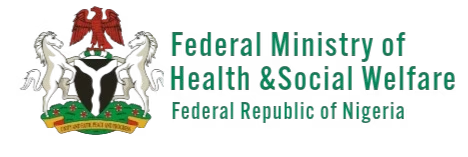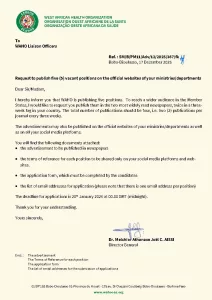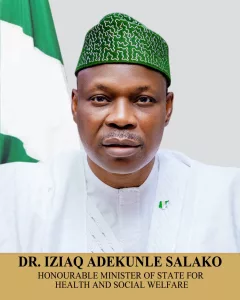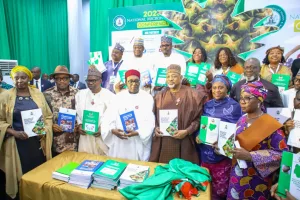Topic: My Health, My Right: Accelerating Universal Health Coverage through Equity, Resilience, and Innovation.
Venue: Calabar International Convention Center, Cross Rivers State|||Date: Thursday, November 20th, 2025
Protocol
- In the last few weeks, the Federal Ministry of Health and Social Welfare in collaboration with the states, private sector and our development partners have been particulary vociferous, pushing the frontiers of ideas and creating the platform for a national discussion on quality of care, resilient health systems, health care financing, equity in access, and several other issues around the health of our Nation, all geared towards delivering on the health priorities the Renewed Hope Agenda. Today, the discourse is still centered around the ever recurring issue of ”Universal Health Coverage” (UHC) with several other elements wrapped around it.
- Without prejudice to the many schools of thought around UHC, what is most paramount in my mind today is what it means to us as policy makers, law makers, implementers and partners, and what it translates to for Nigerians. We frequently express it in numbers and percentages, but what those numbers reperesent is more than just figures, it means mothers having access to skilled birth attendance, children accessing life-saving immunizations, and families saved from poverty by catastrophic health expenditures. Yet, it also represents the opportunity, our mandate to transform Nigeria’s health landscape and help built a healthy and productive population for a prosperous Nigeria.
- So, when millions of Nigerians still lack access to essential health services, then we have an emergency on our hands underscoring the significance of the theme for this 66th NCH “My Health, My Right: Accelerating Universal Health Coverage through Equity, Resilience, and Innovation”. This theme resonates most particularly with the vision of President Bola Ahmed Tinubu GCFR, who declared in his manifestoe document, The Renewed Hope Agenda that “the health of Nigerians is an urgent matter of right”
- It is incontestable that health insurance is our most potent tool to provide financial protection, increase access to quality care, build a sustainable, resilient health system and achieve UCH. The current landscape is that of some progress but concerns remains on the pace of our progress and questions are being asked if we are on track to deliver UCH by our 2030 set date.
- Through the collaborative efforts of the National Health Insurance Authority (NHIA) and State Health Insurance Schemes, health insurance coverage has been expanded from 3% in 2019 to 17% of our population as of October 2024. This represents approximately 37.4 million of 220 million Nigerians now under various health insurance schemes broken down into; Formal Sector Social Health Insurance Programme, 11.2 million beneficiaries; State Health Insurance Schemes, 18.3 million enrolled, and the Basic Health Care Provision Fund (BHCPF), with 7.9 million vulnerable Nigerians currently covered
- Under the Primary Health Care revitalization and expansion programs, 88% of states have established State Primary Health Care Boards, 10,823 Primary Health Care Centers have been revitalized, about 72% of PHCs now offer an integrated service delivery package, and the quality score of our PHCs has improved from 42% to approximately 70% baseline to endline assessment.
- We can also point to commendable sub-national performance and I must appreciate our honourable commissioners for the effective domestication of our national health agenda with respect to UHC in the spirit of sector wide approach. States like Lagos, Kaduna, Enugu, Delta, Kano, Ogun, Bauchi, Cross River, Niger, Kwara, Edo and Anambra State have emerged as beacon of innovation in this regard. Lagos through, LASHMA has achieving over 6 million enrollments, Kaduna State has demonstrated remarkable progress through the enrollment of 2.1 million residents under state health insurance, and a contributory scheme covering about 340,000 informal sector workers while Enugu State has showcased equity-focused interventions with free maternal and child health services reaching 450,000 beneficiaries, and community-based health insurance covering 180,000 rural dwellers.
- Cross River’s has established a technology driven UHC Coordination Centre to serve as the hub its UHC operational frameworks and has achieved 28% health insurance coverage, significantly above 17% national average. Others are showing great promise with enrollment figures ranging from 1.8 million to a minimum of 600,000, representing between 11% to 19% coverage. May I urge all states to use the opportunity of this NCH to learn from one another and move together on a trajectory of progress.
- Our development partners, through strategic investments in our health system, have been highly instrumental in changing the partnership landscape for collective action for impact, expanding coverage, and ensuring a resilient health system. From the World Bank supported IMPACT and HOPE Health Projects, the Department of State (formerly USAID) integrated health programs especially in HIV/TB services, the Global Fund investment in our ATM programs, the WHO, UNICEF and GAVI Alliance support for immunization programmes including the introduction of new vaccines, our development cooperation is being alligned with our national priorities for an efficient and effective health system that serves the people.
- We are also making progress in Digital Health even as we challenge ourselves to improve our performance in areas such as innovation and digital transformation. The National Digital Health Blueprint implementation has put on the health digital map at least 7.2 million Nigerians registered on the National Health Information Exchange Platform. Over 200 hospitals are integrated with Electronic Medical Records systems and mHealth initiatives, reaching at least 4.5 million users with health information. The Edo State Digital Health Initiative is worth of mentioning, where it has recorded biometric registration of 850,000 residents, initiated digital tracking to reduce vaccine wastage by 23%, and provided e-medicine consultation services reaching 12,000 rural patients monthly.
- Distinguish ladies and gentlemen, despite the successes recorded and efforts so far to achieve equitable access to guarantee the health rights of Nigerians, we need to do a lot more at all levels of government, within the private sector, our development partners and indeed by every individual Nigerian. While recognising that as a federation, our solutions to common challenges must respect cultural, social, religious, and other structural differences, we must as a Nation bound by common interest prioritise some tested and proven solutions in order to further accelerate the pace of universal health coverage and ensure that healthcare is delivered as a right to our citizens and not as a privilege.
- In the immediate term, I call on all states council to give priority attention to ensuring mandatory health insurance implementation by domesticating and implement mandatory health insurance laws. States yet to enable a social health insurance scheme should prioritize this and make it happen without any further delay
- May I use this opportunity to advocate to Council members to add their voices to the Basic Health Care Provisions Fund (BHCPF) scale-up and ensure an increase in BHCPF gateway coverage to achieve a doubling of the current coverage to at least 15-20 million persons in the next 6-12 months. As we scale this up, let the focus be on pregnant women, under-5 children, the elderly, persons with disabilities, Nigerians battling with catastrophic health conditions and those at the lowest rung of our socio-economic ladder. Equity, just as well as equality, should define how we prioritise access and scale up coverage. I also call for state level basic healthcare funding ring-fenced by law to compliment the BHCPF in line with 2014 National Health Act.
- Government financing is not enough to close the investment gap in our health systems; it has become a matter of urgent imperative to focus more attention on Public-Private Partnership expansion. A strategic shift in improving access to care is to engage the private sector in managing a significant proportion of our health facilities through strategic purchasing of service delivery. This will also include implementing performance-based contracting for specialized services.
- In the medium term, we need to review our funding strategies and come up with additional innovative financing mechanisms and models. As we implement the new tax laws from January 2026, we must work together to get additional flows to fund public health through possible mechanisms like the fuel tax, sin taxes on tobacco, alcohol, sugar sweetened beverages and consider the establishment of the Diaspora Health Investment Bond to raise up to $500 million in health care financing for Nigeria. The robust relationship being built by Nigerians in diaspora under the leadership of Mr. President is an opportunity we can explore in this regard.
- We must continue to expand our PHC revitalization program by ensuring that the agenda to ensure at least one functional PHC per ward is given priority attention, both at the Federal and State levels. Our task shifting and task sharing policy to achieve service penetration, delivery efficiency, waiting time reduction, and improve patients’ experience should be given implementation priority.
- As part of the Digital in Health initiatives, we will continue to scale up technology-enabled service delivery platforms with a view to delivering a National Health Information Exchange System that connects our health system: public and private, tertiary, secondary and primary to revolutionalise access, quality, efficiency data management and governance. Our vision to implement transparent performance based reward system for our health workers and the leadership of our health facilties will be further facilitated by the comprehensive digitization of our health system which we are working agressively towards.
- In the Long-term it is important to ensure the success of the ongoing human resources for health revolution by working with our ministries of education, regulatory bodies and other agencies including private training institutions producing the critical HRH to expand funding supporting strategic to increase their production capacities of health care workers. We need to continue to implement the national health workforce registry with fidelity and ensure continuous professional development tracking.
- Nigeria will continue to promote local production of active pharmaceutical ingredients, drugs, devices and other consumables. The PVAC initiative of the federal government should be supported and where suitable replicated at the subnational levels to facilitate factors of production and licensing within the control of state governments. State governments should prioritize local production of medical needs suitable for addressing the peculiar health issues in their state, ranging from supplementary foods to treat protein energy malnutrition to other supplies that are needed for diseases peculiar to certain regions.
- As we work together at the National level to craft the policy directions and frameworks to improve UHC, let us all work together to set ambitious targets for health insurance coverage, which should be pursued with vigor and determination. Let us also work together to set a pathway for ensuring that Nigeria meets the minimum 15% budgetary allocation to health at national and state levels within the next half a decade. I must give kudos to Bauchi, Abia, Yobe, Kaduna and Kano in this regard whose records shows that they are already doing 15% and above budgetary allocation to health. But, we must move from just allocation to 100% release to truly demonstrate our commitment to the health of our people.
- To our Development Partners, we appreciate your steadfast support and seek continued collaboration in innovative financing and technical assistance. To our State Commissioners, you are the frontline generals in this battle for universal health coverage. Your leadership, commitment, and focused actions will determine whether we succeed or fail. To Civil Society Organizations, I encourage you to remain vigilant advocates for the voiceless, holding us accountable to our commitments.
- Distinguished colleagues, the right to health is not negotiable. It is enshrined in our constitution and fundamental to human dignity. The journey to Universal Health Coverage demands that we transcend political affiliations, state boundaries, and institutional silos. It requires us to embrace equity as our compass, resilience as our foundation, and innovation as our vehicle. It also requires every Nigerian to take responsibility for their health by making conscious efforts to improve their health literacy, adopting simple health promotion and disease prevention strategies including regular medical check-ups, saving for health through contributory health insurance subscription and seeking health care early when the need arises. Your health is your right, it is also your duty.
- Before I end this address, I wish to call on our health workers currently on strike to the interest of ordinary Nigerians and their professional oaths immediately suspend the strike and come back to work. The challenge in the health sector is not only long standing, it is multifacetted. What I can assure is that the coordinating minister, myself, the permanent secretary and all of us in the Federal Ministry of Health and Social Welfare with the enablement of President Bola Ahmed Tinubu are working very hard to provide sustainable pathways to address the many challenges. I must also use this opportunity to commend the health workers group who despite the many challenges have restrained from going on strike and continues to follow the path of dialogue.
- Let me conclude with the words of Dr. Tedros Adhanom Ghebreyesus: “Universal Health Coverage is a political choice.” Today, distinguished colleagues, we must make that choice boldly, collectively, and irreversibly. Together, let us build a Nigeria where quality healthcare is not a privilege for the few but a guaranteed right for all. A Nigeria where no family chooses between health and poverty. A Nigeria where every child, regardless of geography or socioeconomic status, has an equal chance at a healthy life. Let us leave this council meeting, carrying with us not just the weight of our health statistics, but the faces of the millions of Nigerians counting on our leadership.
- And so with Peace and Plenty, Nigeria shall be blessed. Thank you for your attention.




